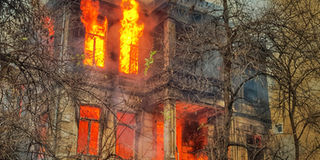Keeping your home safe from fire

Most home fires are a result of negligence, poor handling of fire igniting equipment such as stoves, lighting systems and fuel spills, among others. Photo | unsplash.com.
What you need to know:
- The report reveals that the police handled more than 1,000 fire emergencies in 2020. Most of these, the police reveal were due to negligence, poor handling of fire-igniting equipment such as stoves, and lighting systems, and fuel spills, among others.
Fire outbreaks in homes can result in loss of property and sometimes lives. Some are accidental while others are acts of arson. Police reports indicate a rampant prevalence in the number of fire emergencies in homes. The report reveals that the police handled more than 1,000 fire emergencies in 2020. Most of these, the police reveal were due to negligence, poor handling of fire-igniting equipment such as stoves, and lighting systems, and fuel spills, among others.
Joseph Mugisha, the former Uganda police director Fire and Rescue Services, says fires in homes require homeowners to be vigilant.
He says, “There is no living environment that is fireproof. However, any homestead can be protected against fire.”
Here are a number of ways you can protect your home from fire outbreaks.
Location
Mugisha urges property developers to be intentional about the geographical location of their properties.
“Avoid areas located close to electricity distribution transmission lines, rubbish dumps, wooden or timber yards, fuel distribution stations because these places are prone to fire outbreaks that might consequently affect your home,” he says.
Arthur Ruhyama, the managing director at Fire Extinguisher Services, notes that a common cause of fires is faulty wiring and outlets. He, therefore, urges homeowners to hire a professional to carry out the wiring in a home. He also recommends regular inspection to identify outlets that are damaged or worn-out and replace them immediately. Warning signs include outlets that are loose, smoking, sparks or strange odours coming from the outlet. Fuses that need to be reset should be replaced.
Get rid of appliances that have a tendency to overheat, extension cords that do not function properly and avoid plugging multiple cords in one outlet. Make sure that outlets that are within reach of a sink or any water source are protected to avoid fires. Similarly, when building a home in a fire prone area, avoid materials such as grass thatched or soft wood that might be easily burnt down.
Preventive measures
It is important to separate rooms with walls and doors because partitioned spaces are not as easily damaged by fire as those that are open. This is simply because some rooms are more susceptible to fires than others.
“The kitchen with its stoves, multiple appliances is more susceptible to fires and should be separated from the lounge and bedroom with strong fire resisting walls that run up to the roof together with fire resistant doors,” Ruhyama recommends.
He suggests installing a lightning arrestor or insulator in homes to prevent lightning strikes that might spark off a fire.
A lighting conductor guides the lightning to the earth and protects your home against damage and fire caused by direct lightning strikes.
You can use your landscaping to create breaks that can change the path and behavior of fires. For instance, the distance of your trees is an important factor to proofing your home against potential fires.
Trees should have a minimum of eighteen feet between their crowns to prevent a fire from jumping. The mature canopy should be no closer than 10 feet to the edge of any buildings, while shrubs in the area should be limited to small clusters that break up vegetation.
Planting fire-resistant plants are another excellent way to make your home fireproof. Fire-resistant trees include cherry, birch, and poplar. Mow your grass as well to keep the fire from spreading.
Fire security systems
One of the most effective ways to fireproof your home is to purchase a fire extinguisher. A fire extinguisher can put out a fire quickly before it spreads throughout your home. It is critical to keep a fire extinguisher in an easily accessible location to ensure that it is always available.
It is also a must to get an ABC rating fire extinguisher as it is suitable for use with fires involving ordinary combustible materials, flammable liquids, and energised electrical equipment. Installing a fire alarm system is another important thing you can do to keep your home safe.
In case a fire occurs, you aware of it as soon as possible so that you can either put it out or escape. The first step to protecting lives and property from the consequences of fires is setting up a high-quality fire alarm system. After installing it, it is important that you keep the system well-maintained to make sure it is always working at its best.
Sensitisation
Behavioural patterns by residents are the biggest causes of fires in homes. According to Arthur Ruhyama, the managing director at Fire Extinguisher Services, there are negligent tendencies among occupant that contribute to fire accidents in homes.
He explains: Irresponsible habits such as mishandling cigarettes, light igniters such as matches and leaving the mosquito coils or candles next to beddings and curtains are minor practices that risk the lives of occupants.”
DON'T MISS: New details emerge on Kawempe house fire
The fire expert also cautions homeowners against poor housekeeping practices such as leaving towels on cooking equipment or handling electric appliances poorly.
He tips: “Avoid overloading electric circuits with many power-consuming appliances and always make sure that the circuits are not used for long or left unattended to cause overheating and eventual fire sparks.”





